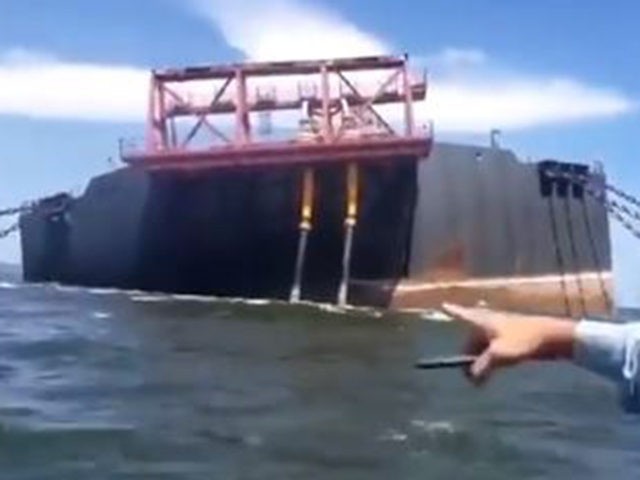Environmentalist groups sounded the alarm this week over a stricken Venezuelan oil tanker in the Caribbean carrying 1.3 million tons of crude that risks slowly sinking into the sea, according to recent inspections.
The tanker, carrying oil from the socialist-controlled Petróleos de Venezuela (PDVSA) state oil company, may trigger an environmental disaster spanning two continents.
The Nabarima tanker has lain in the Gulf of Paria between Venezuela and Trinidad and Tobago since January 2019, when the U.S. imposed sanctions on Venezuela’s socialist regime that outlawed companies based in the U.S. from trading with PDVSA.
After being stranded for nearly two years at sea, the tanker has now fallen into a state of disrepair and is tilting dangerously to the side, leading to concerns that it may sink. Venezuelan authorities had prevented foreign countries from inspecting the ship until this Tuesday, when a team from Trinidad and Tobago were finally granted access to assess the situation.
“The objective is to emerge with a report based on data and scientific observations focused on the safety and stability of the vessel and an assessment of any potential risk of environmental damage,” explained Trinidad Foreign Affairs Minister Amery Browne.
“Whilst we recognize that the vessel in question belongs to Venezuela and is located in Venezuelan waters, the government of Trinidad and Tobago has been consistently using all available diplomatic channels to press for this inspection opportunity on behalf of the many concerned people of our country, and as part of our commitment to do everything in our power to help safeguard the marine environment,” he continued.
Last Friday, the socialist Venezuelan regime also allowed the Trinidadian environmental group Fishermen and Friends of the Sea to visit the ship to assess the risk of a potential spillage, which would devastate the local fishing industry they represent. In a video posted on social media, the group’s corporate secretary Gary Aboud showed the ship tilting and suspended by anchor chains.
“If something goes on, if we have bad weather, there are a number of circumstances that could cause the vessel to flood, and then we have no recourse,” he explained in the video.
#18Oct | Fishermen and Friends of the Sea (FFOS) denunció las pésimas condiciones del tanquero que se encuentra en el golfo de Paria.
Señala que el FSO Nabarima contiene 1.300.000 de barriles de crudo a punto de ser derramados en el Delta del Orinoco. pic.twitter.com/CZ97lZxa3H
— El Diario (@eldiario) October 18, 2020
Aboud added that neither the Maduro regime in Venezuela nor the government in Port-au-Spain had shown any urgency in addressing the issue, with the two sides last meeting in April when Nicolás Maduro’s deputy Delcy Rodriguez visited Trinidadian Prime Minister Keith Rowley.
“Certainly you shouldn’t be telling Trinidad and Tobago that for 72 days you’ve been unable to get clearance for experts to go in and examine an environmental catastrophe that is about to happen,” Aboud said. “We feel betrayed and abandoned by our government.”
Last week, the U.S. Embassy in Port-of-Spain called for an immediate response to prevent any environmental disaster and accused the Maduro regime in Venezuela of having no interest in “activities addressing safety, environmental, or humanitarian concerns.”
“We strongly support immediate actions to bring the Nabarima up to international safety standards and avoid possible environmental harm, which could negatively impact not only the Venezuelan people but also those in nearby countries,” the embassy said in a statement. “PDVSA has a responsibility to take action to avoid an environmental disaster in Venezuelan waters.”
The United States remains concerned by the potential risk to safety and environment posed by the Venezuelan-flagged vessel, Nabarima, in the Gulf of Paria. Read more: https://t.co/v3BK1aMFUK pic.twitter.com/NtyqEgAypJ
— U.S. Embassy POS (@USinTT) October 16, 2020
It is not the first time that the Venezuelan regime has presided over a potential environmental disaster. In August, satellite images revealed a significant, unreported oil spill on the beaches of the country’s western Falcón state, causing huge damage to the local ecosystem. According to sources who spoke with Reuters at the time, the oil was likely spilled from a ship’s fuel tank. The Maduro regime has refused to comment on the incident.
Based on the data we have now reviewed along with an AIS playback, we have good reason to believe that a cargo vessel departing from #LaGuaira, #Venezuela has spilled its fuel oil following a possible failure. Vessel is currently broadcasting "not under command". #OOTT #OilSpill https://t.co/I0xIWlPR20
— TankerTrackers.com, Inc.⚓️ (@TankerTrackers) August 2, 2020
Follow Ben Kew on Parler, Facebook, or Twitter. You can email him at bkew@breitbart.com.

COMMENTS
Please let us know if you're having issues with commenting.